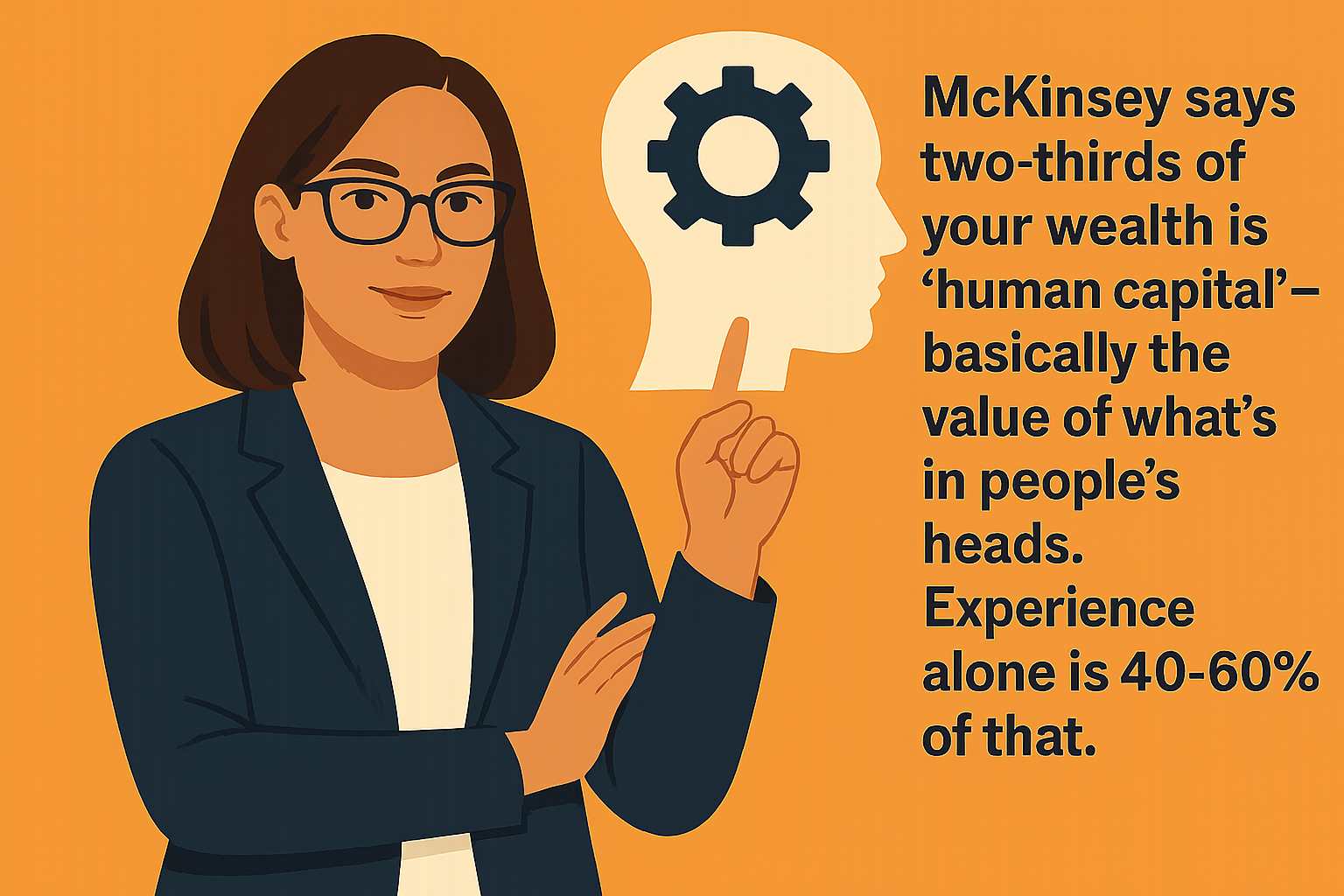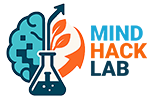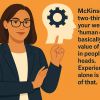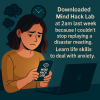
From Human Capital to Real ROI: Why Life Skills Are the Missing Link
Life skills for workplace anxiety, stress management, and professional development
McKinsey says two-thirds of your wealth is "human capital" - basically the value of what's in people's heads. Experience alone is 40-60% of that.
Cool stat. Meanwhile I just watched our best developer quit because she couldn't handle another "urgent" Friday evening meeting. That's $150K walking out the door, not counting the three months it'll take to find someone half as good who'll probably also burn out within a year because we refuse to address the actual problem.
The Math That Should Terrify Your CFO
So I went down this rabbit hole at 2 AM (because that's when anxiety brain does math apparently) and the numbers are insane:
- Wasted meetings: $37-399 billion annually in the US
- Bad communication: $62 million per year for big companies
- Burnout: Over half of workers are cooked, costs 1.5-2x salary to replace
- People who've mentally quit but still show up: $8.8 trillion globally
That's trillion with a T. Twelve percent of world GDP just... gone. Because we can't figure out how to help people not lose their minds at work.
Downloaded Mind Hack Lab during a particularly brutal quarter-end when I realized I'd forgotten how to sleep. The 30-minute session on stress mastery made me realize something - we're all just pretending we know how to handle modern work. Spoiler: we don't.
Your Human Capital Is Leaking Everywhere
Here's what kills me: companies spend millions on "human capital strategy" but ignore the actual humans. McKinsey's research proves experience is 40-60% of human capital value, but we measure everything except what matters.
True story from last week: Senior analyst has a panic attack before a board presentation. Freezes completely. Can't remember her own data. We've invested $200K in her development but zero in teaching her how to not have her amygdala hijack her brain when the CEO stares at her.
That's not a performance issue. That's a "we never taught her the life skills to access her actual skills when it matters" issue.
wait this reminds me of something the Mind Hack Lab AI coach mentioned - apparently there's this thing called the availability heuristic where your brain thinks whatever you can easily remember is what always happens. So that ONE bad presentation becomes "I always freeze in presentations" even if you've done 50 good ones.
No wonder everyone's terrified all the time.
The 10 Life Skills Nobody Talks About (But Your Spreadsheet Should)
Mind Hack Lab has this framework of essential life skills that actually map to business outcomes. Not in a "synergistic paradigm shift" way but in a "people can actually function" way:
Stress Mastery & Work-Life Balance
Fewer meltdowns, fewer stress leaves, fewer people updating LinkedIn at lunch
ROI: Maybe your best people won't quit via Post-it note this time
Rest & Recovery Mastery
Because people who sleep make better decisions than the walking dead we've all become. Revolutionary concept: humans need rest? Who knew?
Focus & Self-Management Skills
Maybe we could have productive meetings if anyone could concentrate for more than... sorry what was I saying? Oh right. Focus. The open office killed it. RIP.
Confidence & Calm Under Pressure
Nothing says "promotion-ready" like remembering your own name during presentations. Actually did a Mind Hack Lab brief intervention for this last week. There's some technique with breathing? Or tapping? I was panicking too hard to remember but somehow I survived the quarterly review without my voice doing the shaky thing.
Emotional Mastery & Self-Forgiveness
Still thinking about that email from 2019? Same. Apparently holding work grudges is expensive. Who's tracking the ROI of resentment? Someone should.
wait I'm forgetting some. Let me check my notes. Why did I think I could remember 10 things at 2 AM?
Connection & Communication Skills
We spent $62M last year on "miscommunication." That's not a typo. That's what happens when everyone's too anxious to ask clarifying questions. Maybe if we could talk like humans instead of corporate robots sending "per my last email" passive aggression...
Productivity & Achievement Skills
Currently reading this instead of finishing that report due tomorrow? Yeah, me too. The irony isn't lost on me.
ROI: Things actually getting done before the panic sets in.
- Decision-Making - Something about cognitive biases making us predictably stupid. More on that later when I remember where I put that research.
- Motivation & Drive - For when "just try harder" isn't working. Spoiler: it never works. The Mind Hack Lab AI coach said something about intrinsic versus extrinsic but I was too tired to process it.
- Self-Awareness - Leaders who actually notice when they're being assholes. Rare but valuable. ROI: Fewer people quitting because of "leadership differences" aka your boss is insufferable but HR won't let us say that.
These aren't soft skills. They're "the actual skills you need to not implode at work" skills.
Your Brain's Factory Defects (Now With Science!)
So apparently behavioral economics proves we're all predictably stupid. Great. The Mind Hack Lab stuff mentioned these biases that explain why work feels impossible:
Loss Aversion
We feel losses twice as hard as gains. Which explains why I still remember that one bad review from 2017 but forgot all the good ones. Kahneman and Tversky won a Nobel Prize for basically proving humans are irrational. Thanks, I guess?
Sunk Cost Fallacy
"We've always done our status meetings this way." Yeah, and they've always been useless. But we can't stop now because... reasons? This is literally why that terrible Wednesday sync still exists.
Planning Fallacy
Everything takes 3x longer than we think. My "quick" email check this morning? Two hours. That "simple" project timeline? Add six months. We estimate like goldfish who've never met deadlines before.
Fundamental Attribution Error
When I'm late: traffic was insane, my kid was sick, the universe conspired against me. When Brad's late: he's irresponsible and doesn't respect my time. This bias alone explains 90% of performance review drama.
tried tracking my own biases in the Mind Hack Lab workbook. Turns out I have approximately all of them. The impostor syndrome mixed with overconfidence bias is particularly fun. I simultaneously know nothing and think I should run the place. Very stable, very normal.
Fine, Here's the Spreadsheet Version So Your CFO Won't Hyperventilate
Even tiny improvements move millions:
The Numbers That Matter
5% fewer wasted meeting hours → $1-3M saved annually
Or we could keep pretending that daily standup where everyone says "no blockers" while dying inside is worth $1,000 per hour
Keep 50 people from rage-quitting → $7.5-10M saved
That's assuming 1.5-2x salary replacement cost. Probably low since you also lose their unwritten knowledge of which printer actually works
1% better communication → Millions saved in not redoing everything
Remember that project we had to completely rebuild because nobody understood the requirements? Yeah, that. Total US losses are $1.2-2 trillion from bad communication. TRILLION.
20% more internal promotions → Stop paying recruiters to find what you already have
External hires cost 30% more and take forever to figure out your bizarre acronyms. But sure, let's keep ignoring the person who's been doing the job without the title for two years.
Math I definitely didn't double-check at 3 AM but sounds right: Average salary $70K, multiply by your headcount, multiply by whatever percentage of time you waste on preventable BS. It's millions. Trust me. Or don't. I'm tired.
Why Traditional Training Is Where Hope Goes to Die
Corporate training is like teaching someone to swim by showing them a PowerPoint about water. Nobody needs another two-day workshop with trust falls and personality tests.
People need:
- Techniques that work when your brain blue-screens mid-presentation
- Skills you can use tonight, not after completing a 47-module course
- Something that admits work is actually hard and your nervous system knows it
Mind Hack Lab gets this. 30-minute interventions based on actual neuroscience. Quick enough that even my ADHD brain can finish them. Practical enough that I've actually used them during real panic moments.
I've done like four different sessions at various crisis points. Can't remember all the techniques (stress brain deletes things) but I definitely panic less. Or maybe I just panic more efficiently? Progress either way.
The Bottom Line (If Anyone's Still Reading This Ramble)
McKinsey's right about human capital being everything. But human capital without life skills is like buying a Ferrari and forgetting to teach anyone how to drive stick. That's how you end up with $150K worth of talent grinding the gears in the parking lot before giving up and taking an Uber to their next job.
The companies that figure this out - that teach actual skills for actual humans dealing with actual work - will eat everyone else's lunch. The ones that don't will keep wondering why their "human capital" keeps walking out the door at 5 PM and updating their LinkedIn on the train home.
The Real Solution
Mind Hack Lab has the framework. The interventions work (mostly, when I remember to use them). The ROI math checks out even if you're conservative about it.
But more importantly, maybe we could create workplaces that don't require downloading crisis intervention apps at 3 AM just to survive Tuesday's all-hands. Radical thought, I know.
anyway it's now 3:47 AM and I should probably try that sleep session again instead of calculating the global cost of workplace dysfunction. Tomorrow's another day of pretending cognitive biases don't run my entire life while simultaneously proving they absolutely do.
The real ROI of life skills? Not becoming another statistic in McKinsey's next report about wasted human potential. Or at least being a well-rested statistic.
downloading the focus management session now because I've rewritten this conclusion four times and keep getting distracted by—wait what was I saying?
Human capital matters. Life skills make it accessible. The money follows. Unless you're still doing trust falls, in which case good luck with that.
actually one more thing about loss aversion and how it explains why we keep doing performance reviews even though everyone hates them and they demonstrably don't work and
Ready to Stop the Human Capital Leak?
Transform workplace anxiety into actual productivity with Mind Hack Lab's evidence-based life skills training.








